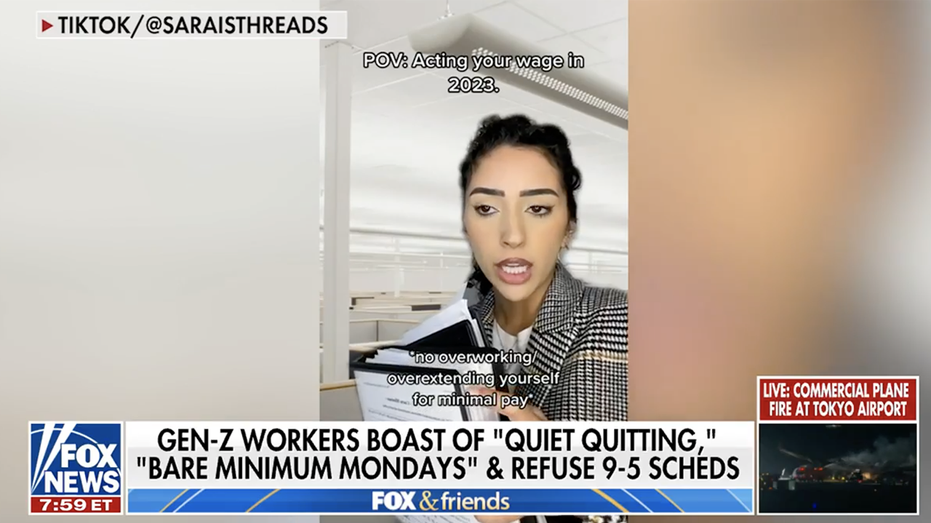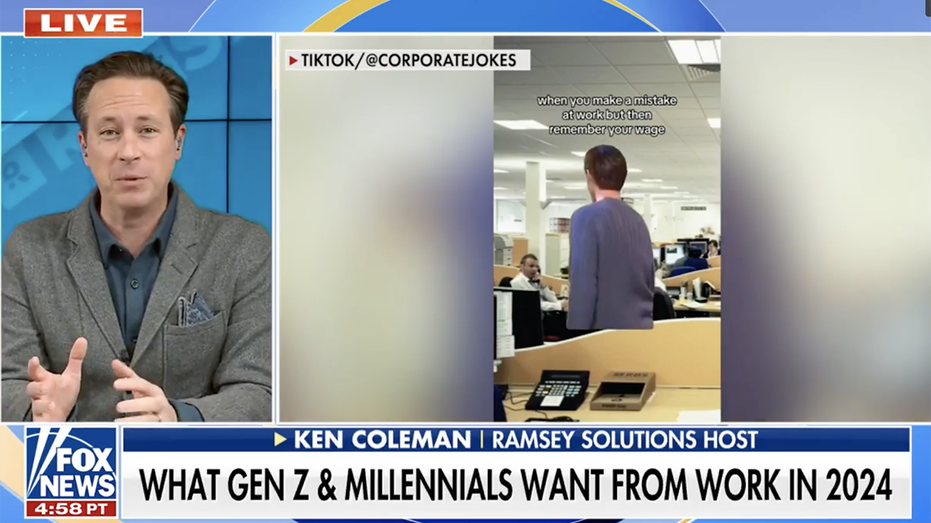As the year 2024 gets underway, millions of workers are heading back to their 9-to-5 jobs after the holiday break.
Quiet quitting, "lazy girl jobs" and "bare minimum Mondays" are the trends on social media still floated by many members of Gen Z as well as millennials — who just don’t want to follow traditional employee standards.
A "lazy girl job" is the term for those who want to quit, while "bare minimum Monday" is explained as someone doing the absolute bare minimum to get through a Monday, according to various TikTok accounts.
Ramsey Solutions host Ken Coleman joined "FOX & Friends" on Tuesday morning to discuss tips for how parents, managers, and employers can handle this mentality in 2024.
"They’ve got to mentor and coach these employees," he said.
Coleman said that employers will need to guide new employees through the day-to-day rather than just throwing them into the mix.
"You’re going to have to coach these younger employees more than you have [those of] any past generation," he said of business leaders and managers.

One of the common trends on TikTok includes younger employees refusing to work 9-to-5 positions and instead getting "lazy girl jobs." (Fox News / Fox News)
He also noted that parents are partially to blame for the lack of a work ethic among their kids.
Coleman said a four-day workweek is in the works and "is absolutely going to be a thing."
The Ramsey Solutions host said that a study was completed in London, which showed that employee productivity did not dip when people worked only four days a week.
However, implementing such a change across the board will not be simple, he indicated.
"You can’t just shove five days of work into four days without some systems, and it’s got to be advantageous to that specific industry," he said.

Coleman of Ramsey Solutions said trends such as quiet quitting and "bare minimum Mondays" are not representative of all people in the younger generation. (Fox News / Fox News)
Coleman made sure to note that although these trends are taking over the career side of TikTok, they are not a full representation of every Gen Z or millennial in the world.
"What we see on TikTok does not represent the entire generation," he said.
He noted that many will continue to work hard and earn the job and career status they want.
However, after young people watch two or three generations of adults work nonstop for their entire lives, they understand why the next generation might not want that same life.
It’s easy to assume that working late nights makes you feel down because you’re not spending your free time doing as you please. It turns out, that’s only part of the issue: working on a screen when it’s dark outside also has a depressive effect on your brain.
And WHOOP’s principal scientist, Kristen Holmes, says economies are nowhere near rectifying this problem and the health fallout because of it—meaning ripple effects on productivity and work satisfaction are likely to continue.
Speaking on the ‘Diary of a CEO’ podcast in an episode released on Jan. 4 Holmes, who is vice president of performance science at the upmarket wearable health-tech brand, outlined that the human body loves regularity but that the modern working age doesn’t allow for this.
“We’re fighting this access to constant light,” explained Holmes. “We’re starting to see the negative consequences of exposure to light after the sun goes down. We haven’t adapted to blue light after dark after the sun goes down.”
Light from screens—be it LED TVs, smartphones, computer screens, or tablets—are artificial forms of blue light which is found most commonly in sunlight.
Many studies have shown blue light impacts eye health and sleep in negative ways, though researchers are pushing for more conclusive answers on long-term impacts.
Holmes, a psycho-physiologist, revealed research has shown that if people are using screens in a so-called “magic period” of time between 10pm and 4am, the blue light has a pro-depressive effect. “It impacts your dopamine system: reward, motivation,” she added. “When we wonder ‘Why do we have a mental health crisis?’ we have to look at light first.”
The context for how far humans have come from their natural state can be found in communities that operate with relatively little—or no—access to electricity.
This harks back to the ages gone by when humans and their circadian rhythms—the natural cycle of physical, mental, and behavioral responses to one’s environment—were dictated by nature alone.
In a world where food delivery is available 24 hours a day and social media never rests, Holmes said humans haven’t evolved in line with the technology they’re creating.
“We’re not evolved to digest food in the middle of the night or to view light in the middle of the night—or to be super active in the middle of the night,” Holmes added.
“It creates this misalignment. If you look at individuals or societies that currently don’t have electricity it’s really interesting to see some of their sleep-wake behaviors … they all fall asleep within 15 to 30 minutes of each other, and they all wake within 15 to 30 minutes of each other.”
Stereotypes like ‘night owls’ and ‘early birds’ are irrelevant to Holmes, who says sleep-wake signals prompted by natural light and dark would override any individual’s choice of when they rested.
“For the most part I don’t think this variability [in sleep patterns] is as pronounced as we say it is,” Holmes added.
Whether it’s reading on a tablet, scrolling through social media, or watching a film before bed, many of the habits adopted in the first world revolve around screen time before sleep.
“What’s hard about this behavior is that it’s really hard for people to not engage with their phones before bed—that has its own addictive properties,” she explained. “We just have to understand that our relationship to light will directly influence the trajectory of our health. There’s just no question about that.”
Preliminary data from WHOOP has indicated, for example, that a night’s sleep can be used to predict an elite athlete’s performance the following day. “Sleep-wake time just continued to ladder up to all of these performance variables that people care about,” Holmes said.
In 2017 Holmes sought to capitalize on this research in her own life, making the time she went to bed and got up a regular occurrence. “I haven’t been sick since 2017,” she added. “I literally have not had a sniffle, a stomach ache, I didn’t get COVID. I didn’t get sick. I do a lot of other things well but that’s the single biggest thing.”

